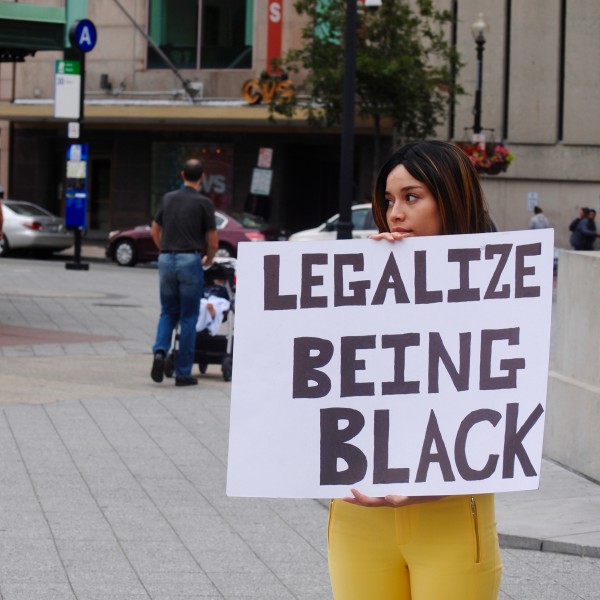
At a meeting to plan a Rhode Island response to the killing of Alton Sterling and Philando Castile, the moderator, a black man, made the point that many in his community feel these deaths – of people they don’t know who live far away – as personally and intensely as they feel the death of a cousin or a friend.
“White people,” he said, “don’t understand that.”
This is true. None of us truly understands the day to day prejudice experienced by people of color in our country absent actually experiencing it. This solidarity of experience escapes most, if not all white people in this country. The bond created across time and distance by systemic oppression is intense, and personal.
I can feel some of this. When Trayvon Martin was murdered, he was about my son’s age. They both wore hoodies and both liked Mountain Dew and Skittles. I felt Trayvon Martin’s death acutely, but my reaction was blunted by my privilege. I didn’t then and don’t now fear for my son’s life the way parents of black children do. My son is white. I have the luxury of keeping my parental fear levels at the lowest setting.
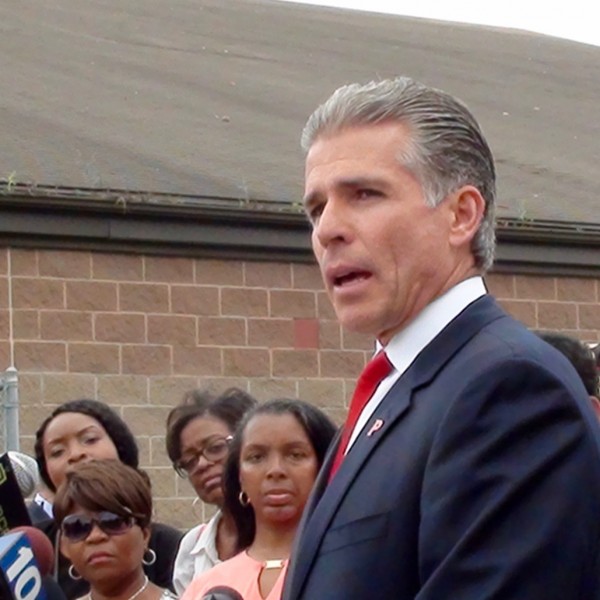
“A part of us died last night,” said Providence Public Safety Commissioner Stephen Paré at a press conference Friday afternoon, “when five colleagues in Dallas, were shot and killed.”
Paré can acutely feel the deaths of police officers far away. He sees the police officers killed in Dallas as colleagues, and can certainly imagine the nightmare of losing five officers in Providence.
But the analogy ends there.
When police officers were murdered in Dallas, Governor Gina Raimondo called a press conference of police and community leaders well within 24 hours. Two United States senators offered words of calm and condolence. Flags were ordered to fly at half mast by government order.
No press conferences were planned for Alton Sterling and Philando Castile. It took the death of police officers to do that. That alone signals our priorities as a culture.
Police can call for back up. They can get the National Guard and the full power of the United States military flown in if necessary. Police can attach bombs to robots and kill by remote control if necessary.
The unlimited force and power of the United States can be brought to bear against those who kill police officers, but when it comes to the extra-judicial murders of people of color by police…
… there is no back-up.
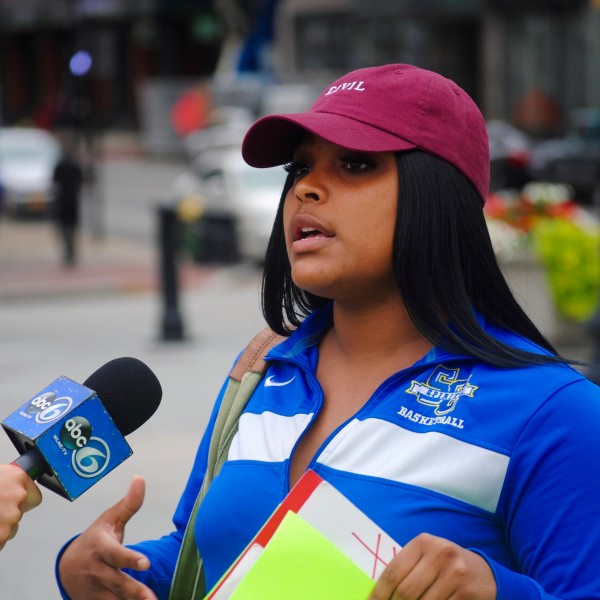
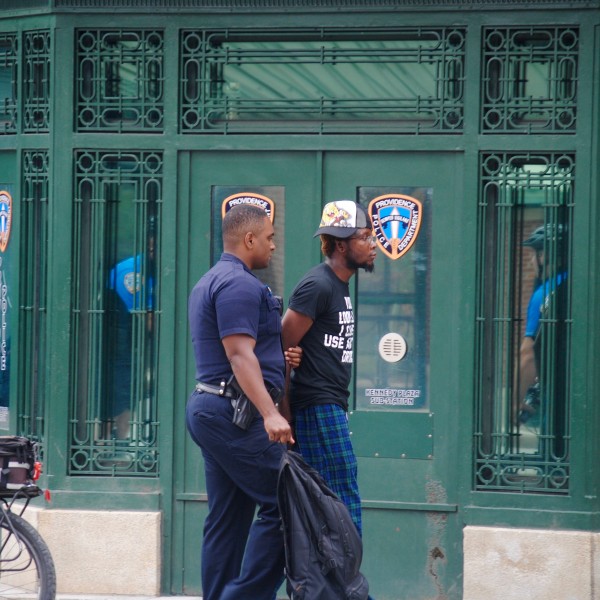
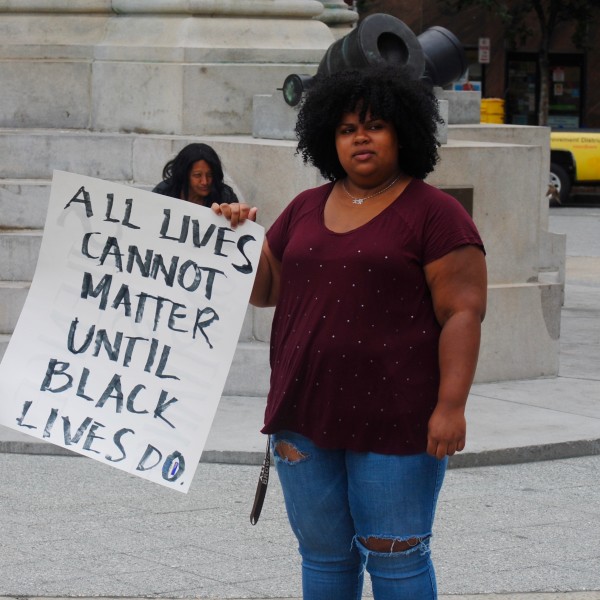
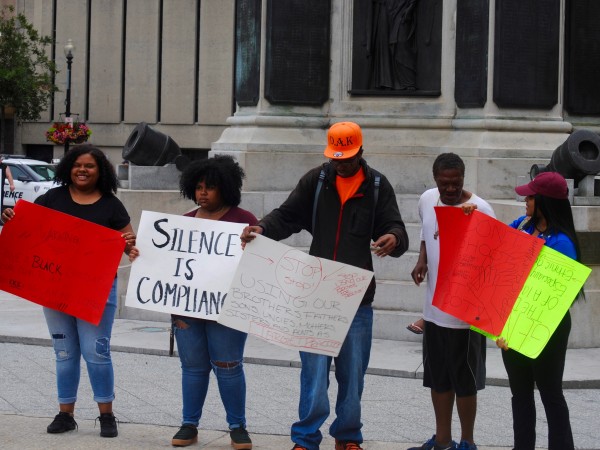
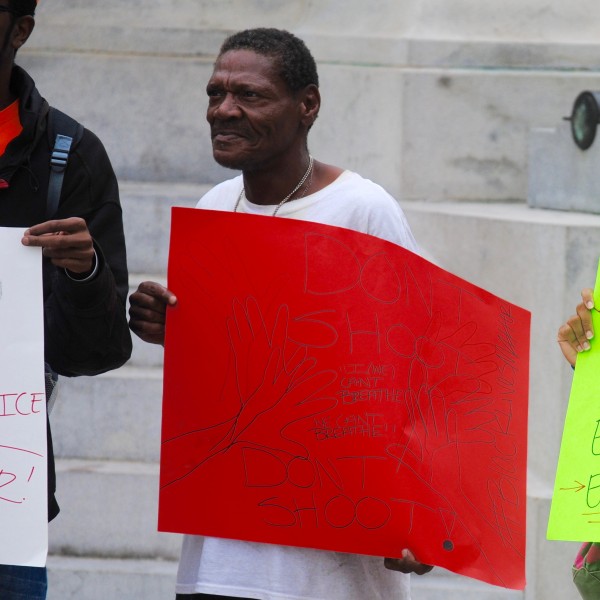
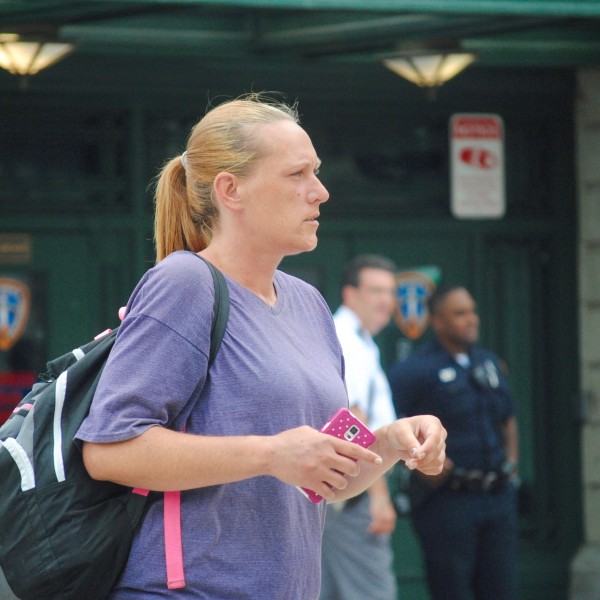
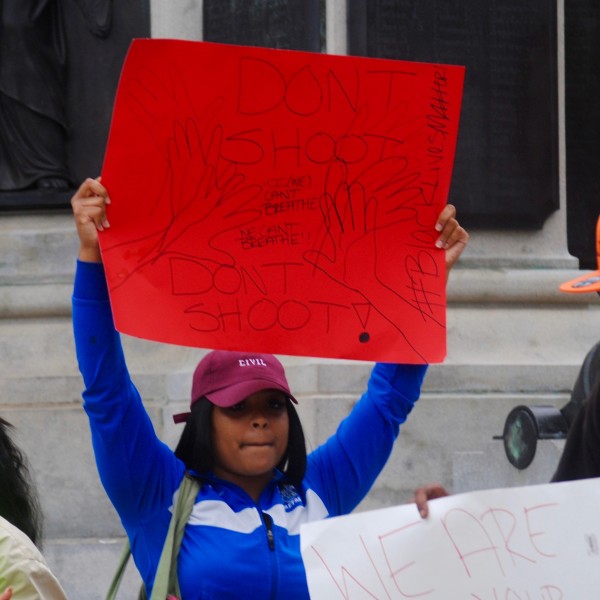
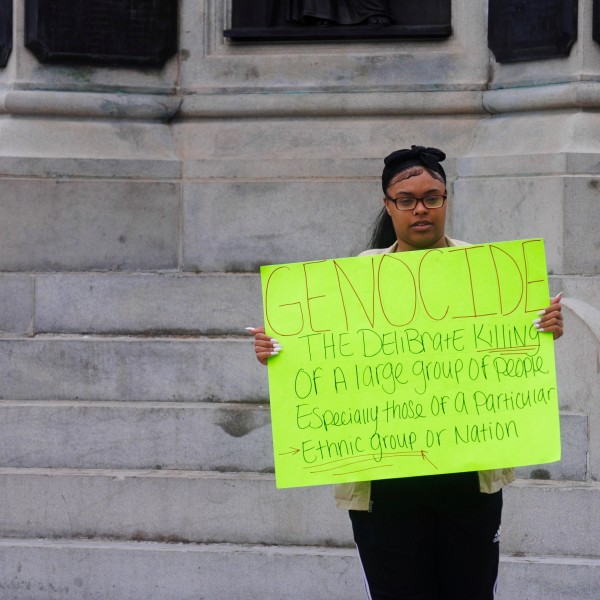
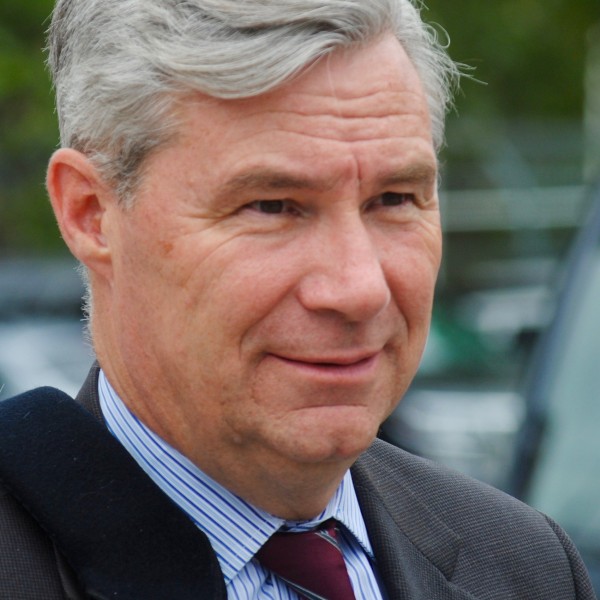
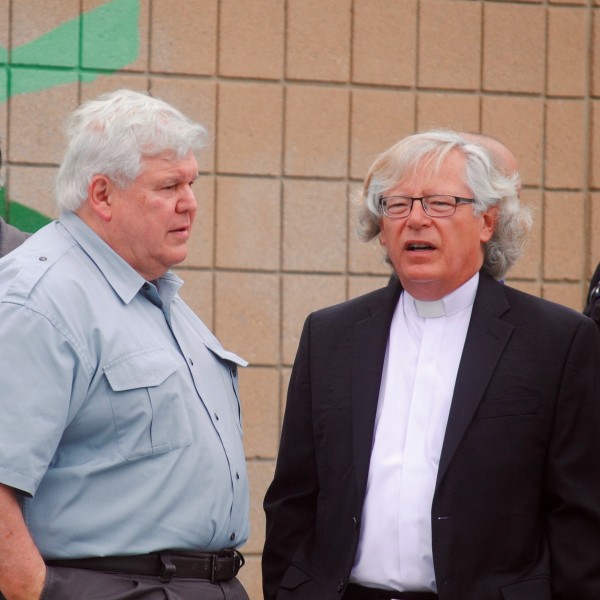
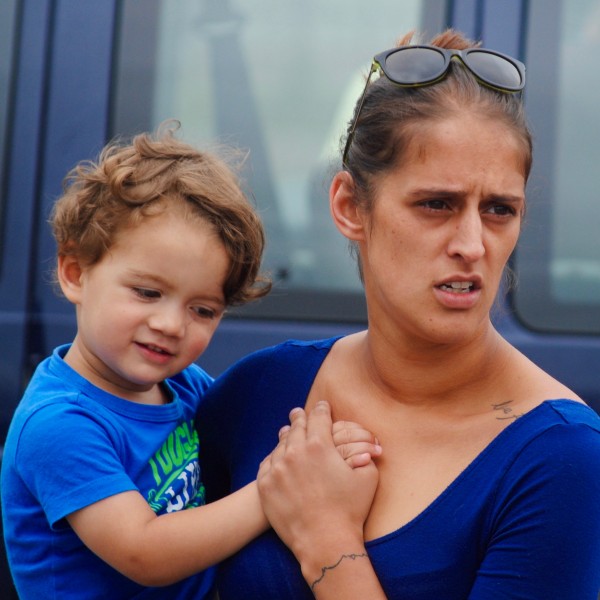
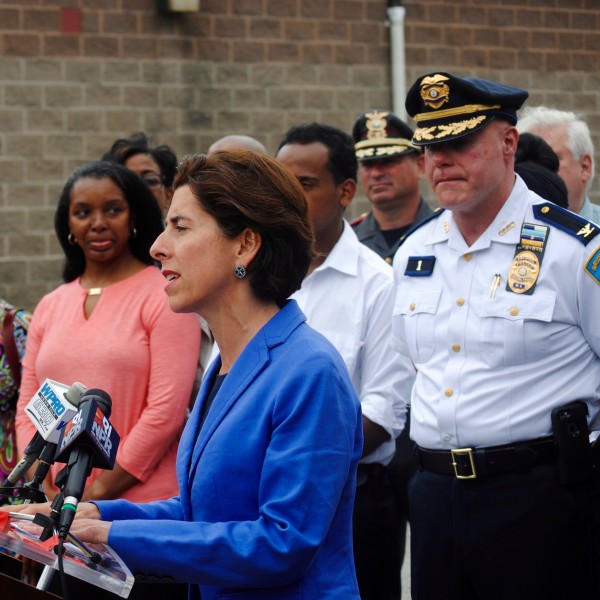
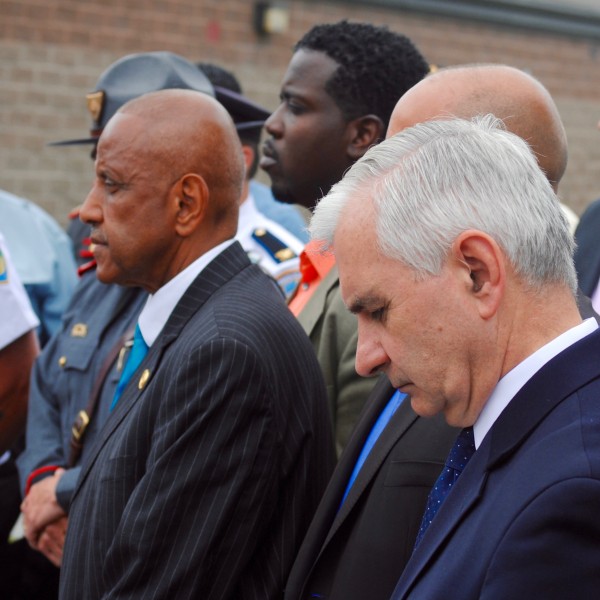
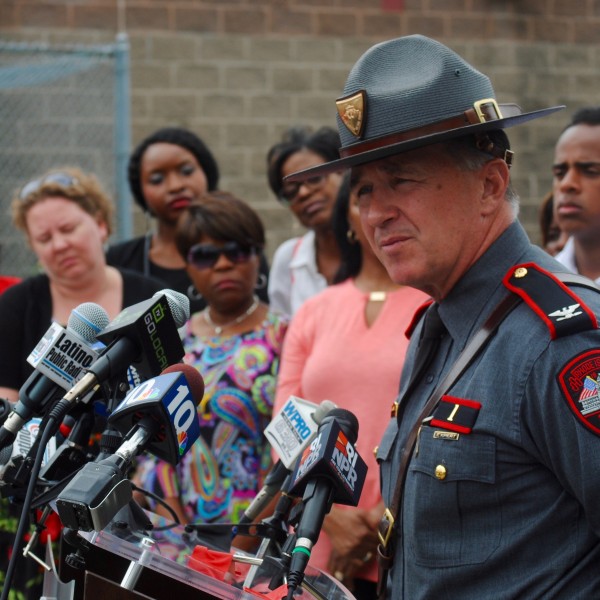
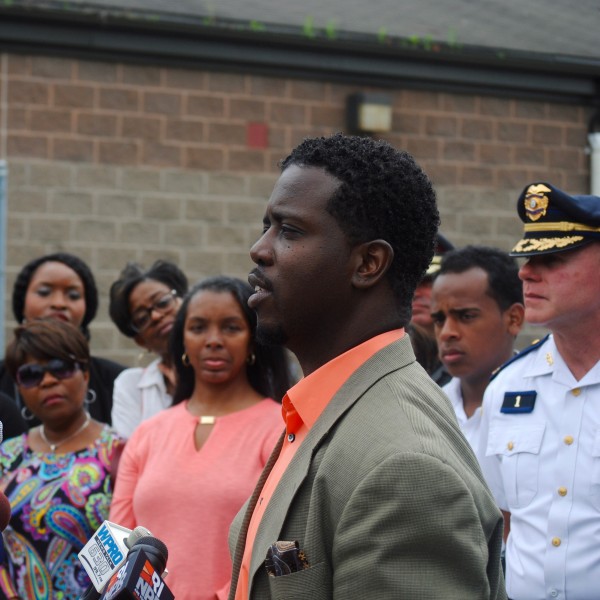
Here’s the full video from the press conference:
]]>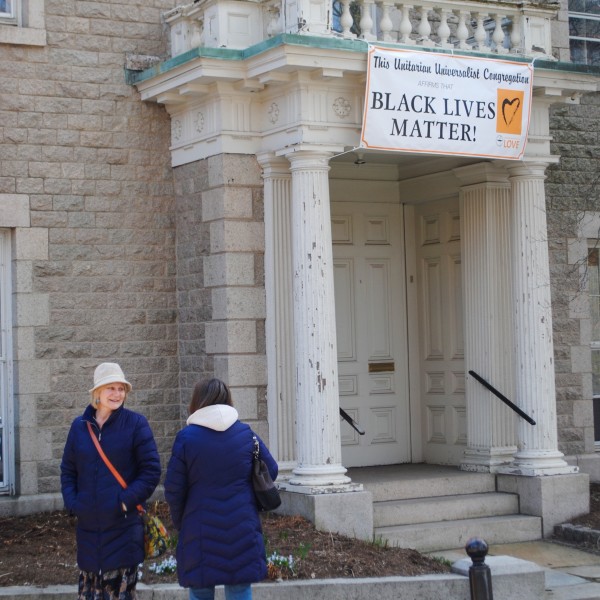
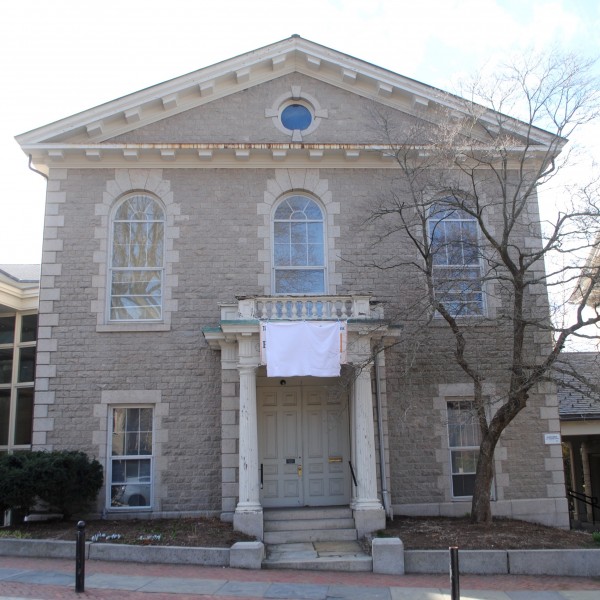
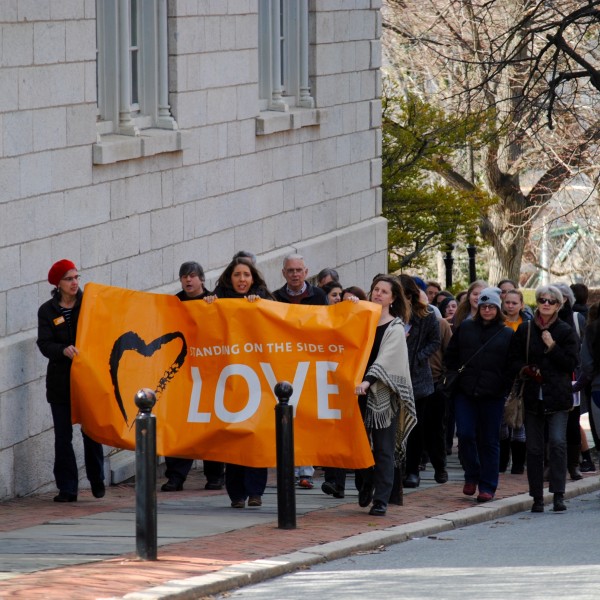
Under the auspices of its Standing on the Side of Love committee, First Unitarian will identify activities in which its members – joined, it hopes, by members of the broader community – can engage to advance this campaign. Such activities could include participating in voter-registration drives, supporting (or opposing) legislation, attending rallies, organizing events to raise awareness and screening relevant films.
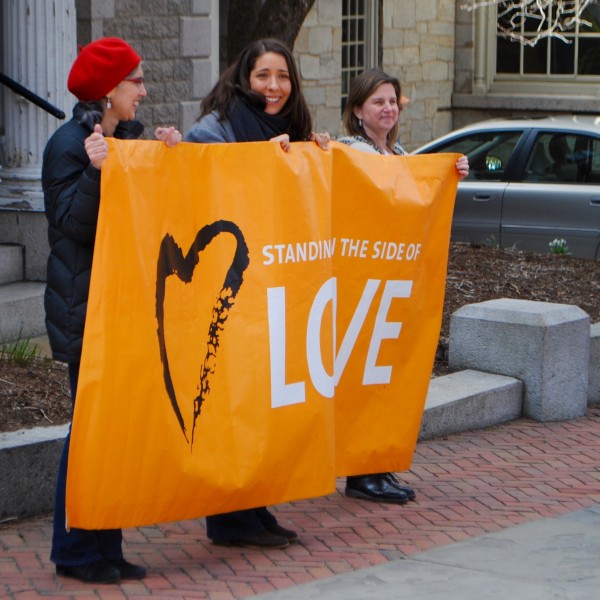
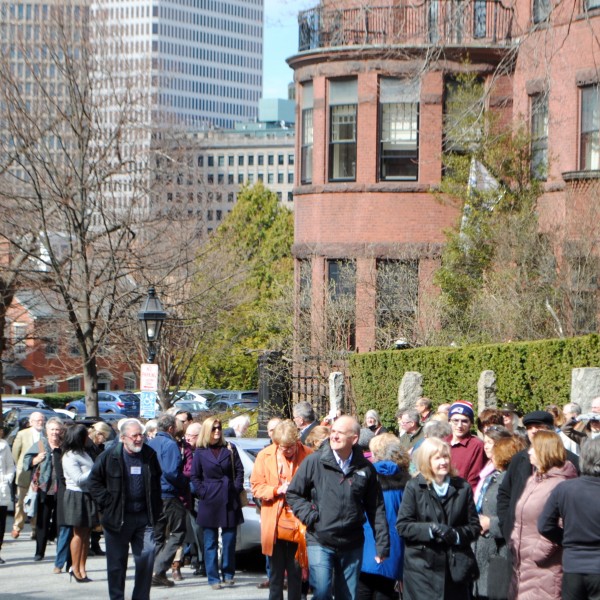

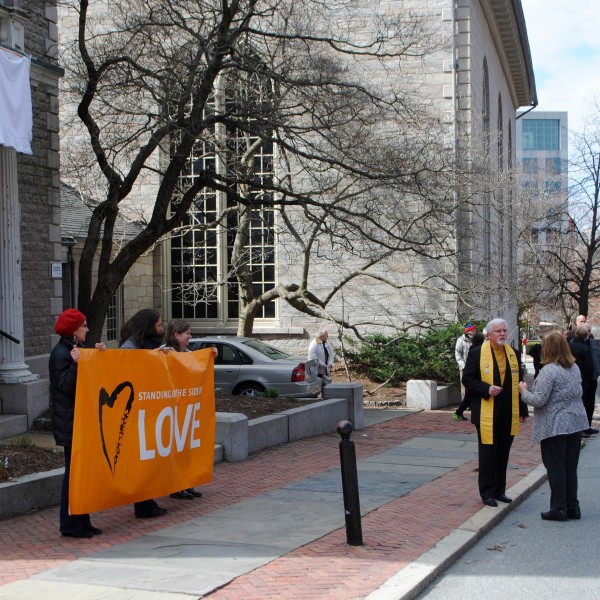
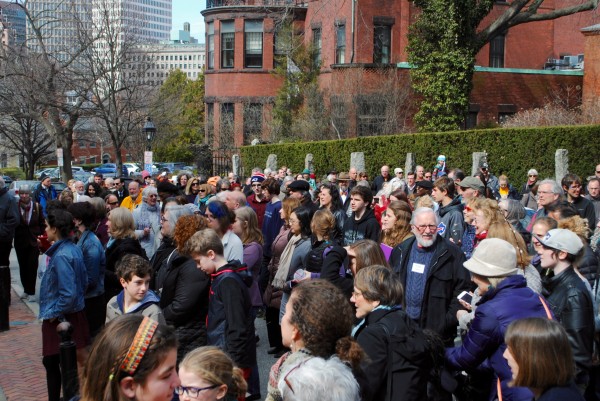
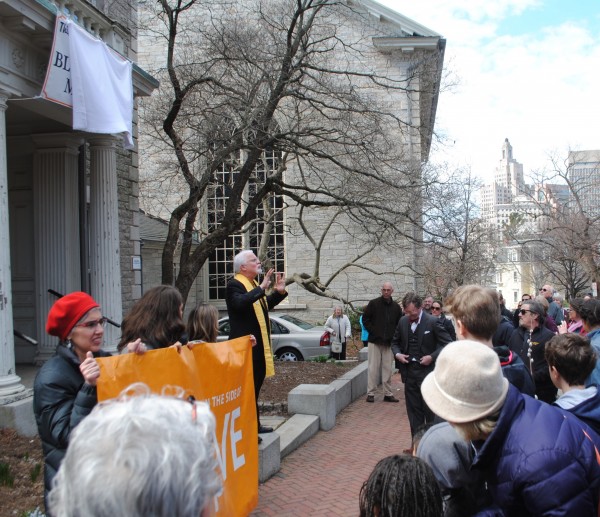
“We are acting in the face of overwhelming evidence that Black people and other people of color are disproportionately harmed and discriminated against by our systems of criminal justice, health care, finance, housing, education and employment,” says Reverend Ortman.
“We are also moved to act by our shared agreement,” he says, “which compels Universalists to walk together in search of the paths of wisdom, compassion and justice.”
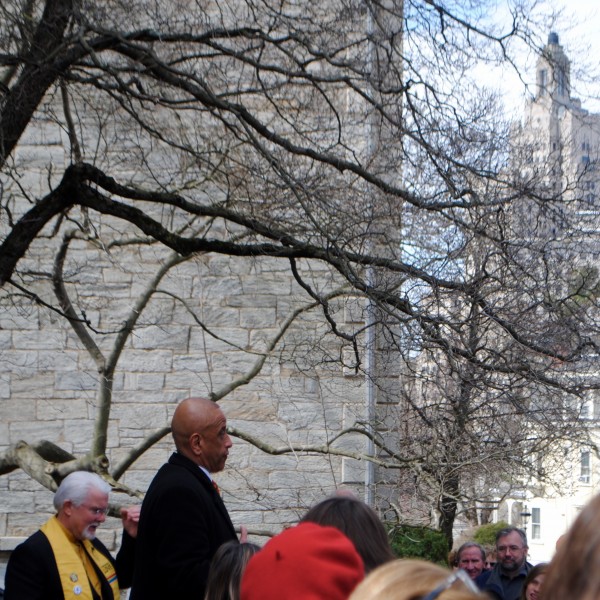
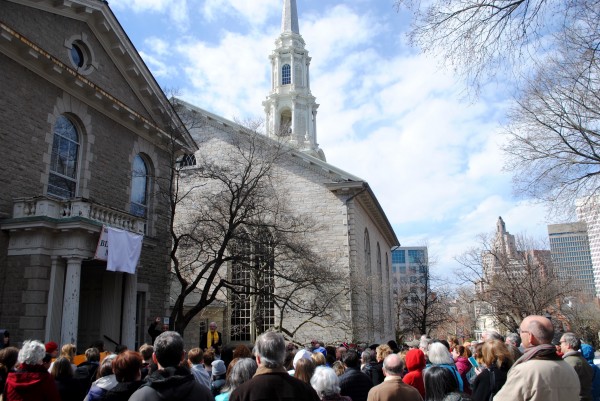
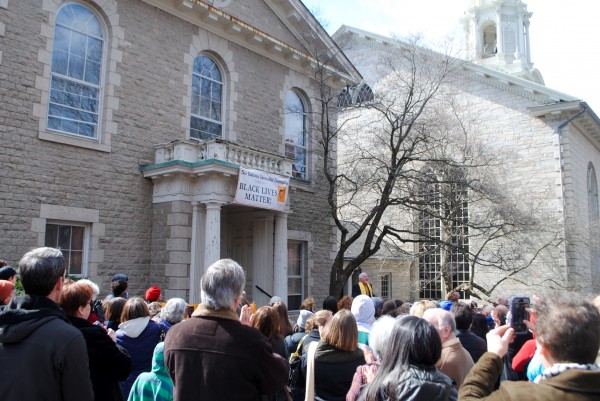
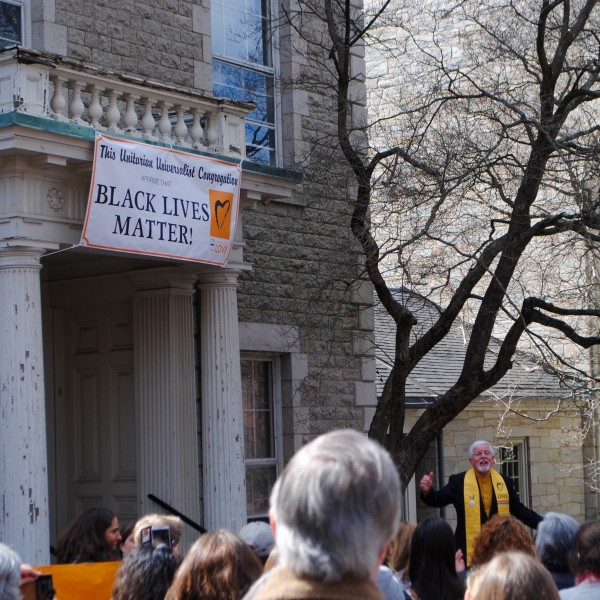
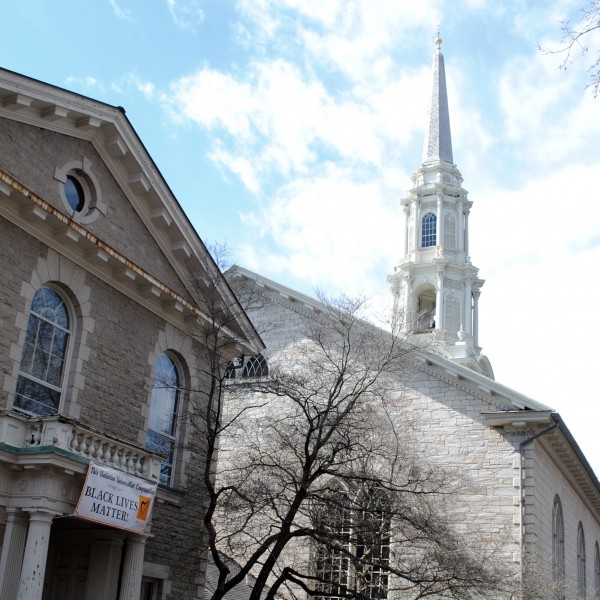
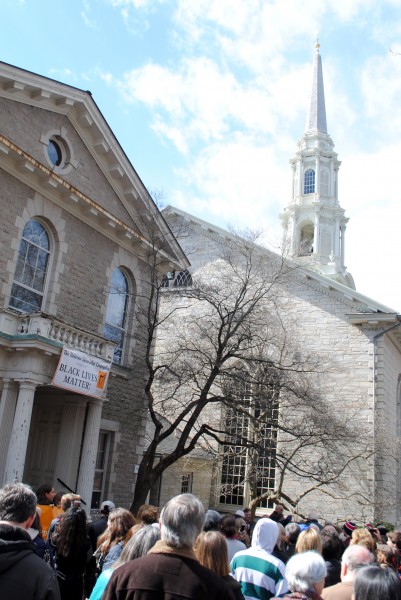
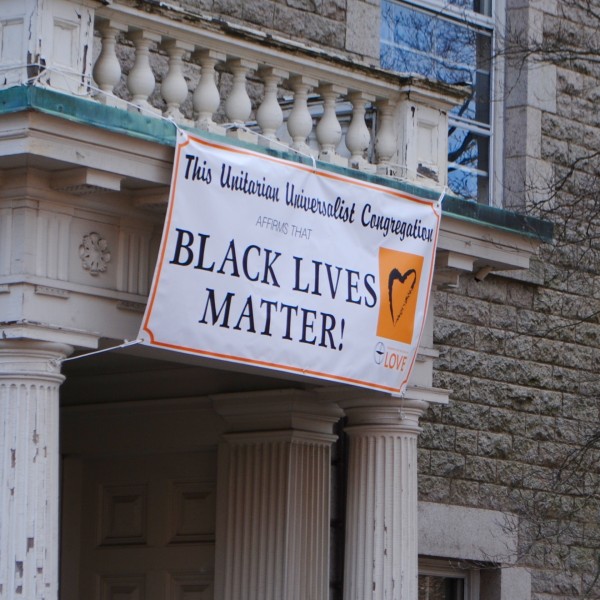
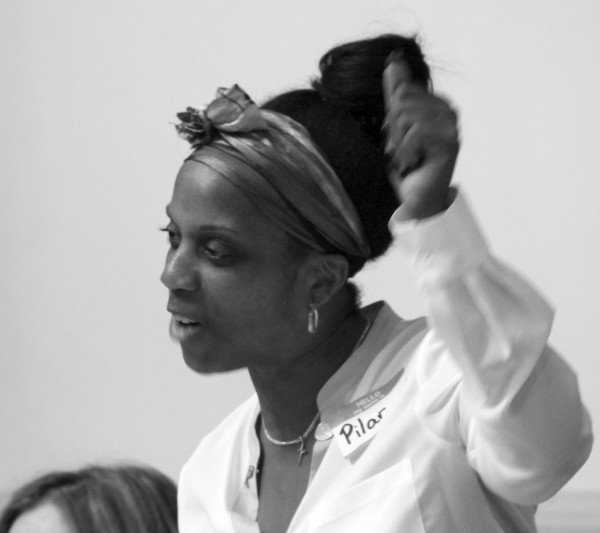
A discussion of Black Lives Matter and the importance of this movement in terms of criminal justice reform, prison abolition and the next phase of Civil Rights in our state was held at the First Unitarian Church of Providence. The mostly white, middle and upper middle class church members were interested in what they could do as a congregation to ally with and support this important movement. Much of what was presented was in line with the liberal values of those in attendance, but when speaker Marco McWilliams, director of Black Studies at Direct Action for Rights and Equality (DARE) spoke about prison abolition and the dismantling of capitalism (admittedly long term goals) some in the audience showed visible reservations.
It was a radical message different from the one that Jim Vincent, President of the NAACP Providence Branch gave. Vincent wanted to convey the immediacy of the problem. Police are killing black people “under the most questionable circumstance imaginable,” said Vincent, and he then proceeded to relate a long list of stories of police killing unarmed black people, ending only because of time constraints and asserting that he could have easily continued for hours in this way. These stories, coupled with startling statistics about the disproportionate rates of black arrests and black incarceration act as a call to action.
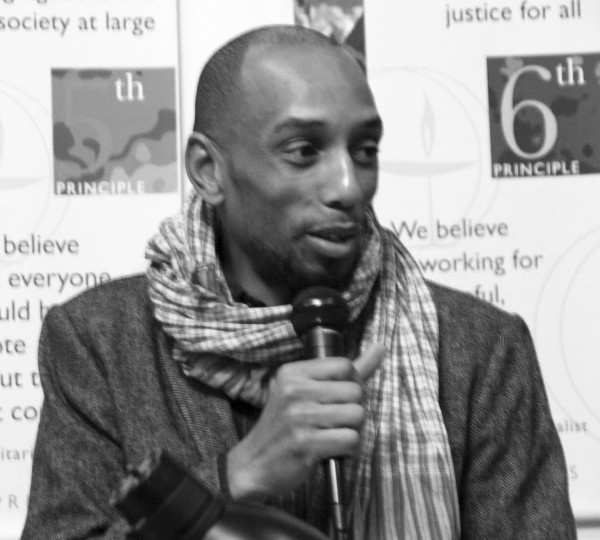
Pilar McCloud, assistant secretary of the NAACP Providence Branch, put the larger structure of systemic racism into a personal context. Despite her college education, as a black woman she is often treated as someone who is uneducated, regarded with suspicion or, as in one story she told, served as almost an after thought at the Starbucks located in the Providence Place Mall. A paying customer, her coffee was delivered long after she ordered, the man behind the counter actually prioritized the coffee of a white woman who ordered after her before preparing Pilar’s drink. McCloud asked for her money back and retrieved her tip from the tip jar.
McCloud also talked about the differences in the conditions of the schools in Providence. Nathaniel Greene located in a neighborhood populated mostly by people of color, is falling apart. Nathan Bishop, on the East Side of Providence, is in immaculate condition. It seems that some students, says McCloud, “…don’t deserve well lit auditoriums or brand new books, and brand new computers, and well shined floors.”
The first speaker of the evening was Susan Leslie, Congregational Advocacy and Witness Director for the Unitarian Universalist Association (UUA) in Boston. She set the tenor of the meeting, stressing the importance of events like these and the involvement of UUA churches in the struggles for civil rights. The UUA, said Leslie, “was slow to respond” to the Black Lives Matter movement, but congregations across the country are beginning to take action. Sixty UUA churches have hung “Black Lives Matter” banners outside their churches. These churches are active as allies (or what McWilliams called “accomplices”) in marches, on corrective legislation such as the Providence Community Safety Act and in calling on their leaders to take action on the abuses of the criminal justice system towards people of color.
The members of the First Unitarian Church of Providence are beginning the process of deciding on whether or not to display a “Black Lives Matter” banner in front of their church. About a third of the banners displayed across the country have been vandalized or stolen, said Leslie, but these churches have held “really powerful rededication ceremonies” and “recommitted in the face of that.” This provides imporatnat opportunities for community engagement and bridge building.
Below are the full videos of all the speakers and the robust Q&A that concluded the evening.
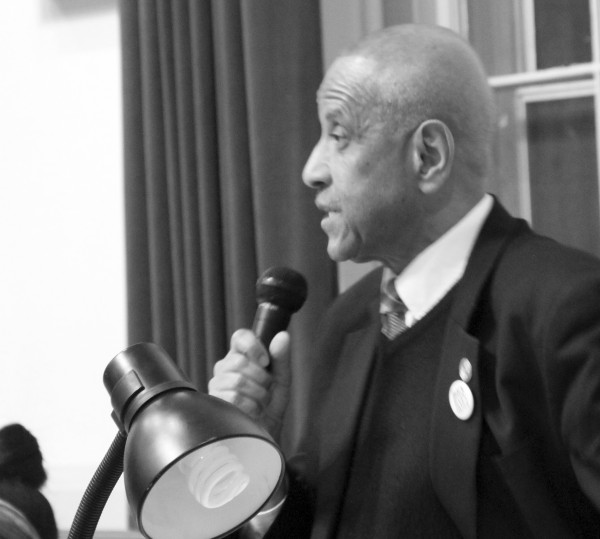
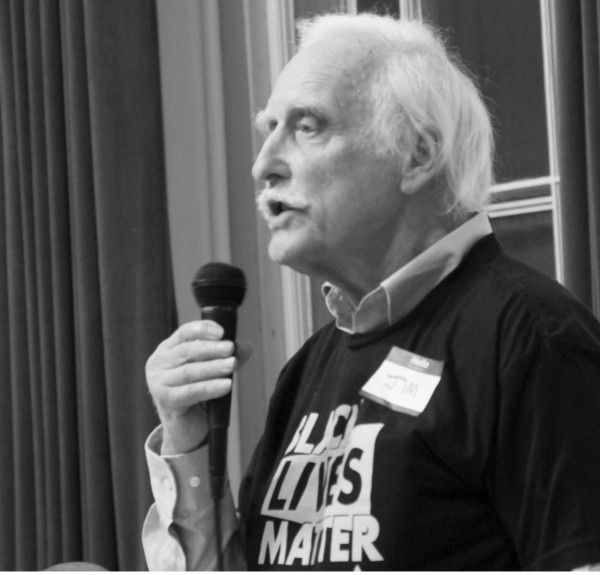
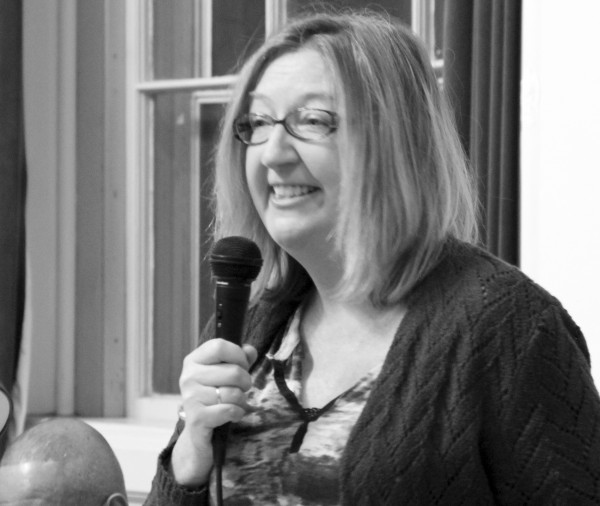
 The American Civil Liberties Union of Rhode Island, the NAACP Providence Branch, the George Wiley Center, the American Friends Service Committee – South East New England, and Providence Student Union today filed an open records request with the Rhode Island State Police requesting the full report of its investigation, conducted in conjunction with the Pawtucket Police Department, into the actions of a school resource officer who was recorded body-slamming a 14-year-old student at Pawtucket’s Tolman High School on October 14. The groups are also seeking the evidence gathered in the investigation, as well as documents related to any review of the pepper-spraying by Pawtucket Police of students protesting on the day following the incident.
The American Civil Liberties Union of Rhode Island, the NAACP Providence Branch, the George Wiley Center, the American Friends Service Committee – South East New England, and Providence Student Union today filed an open records request with the Rhode Island State Police requesting the full report of its investigation, conducted in conjunction with the Pawtucket Police Department, into the actions of a school resource officer who was recorded body-slamming a 14-year-old student at Pawtucket’s Tolman High School on October 14. The groups are also seeking the evidence gathered in the investigation, as well as documents related to any review of the pepper-spraying by Pawtucket Police of students protesting on the day following the incident.
The request, filed pursuant to the state’s Access to Public Records Act (APRA), was made after the State Police announced it had completed its review of the incident and found that the officer in question behaved appropriately. In their APRA request, the groups noted that they are not calling the report’s conclusion into question, but consider it important that the public be able to understand the report’s finding and see all the evidence used to reach this conclusion.
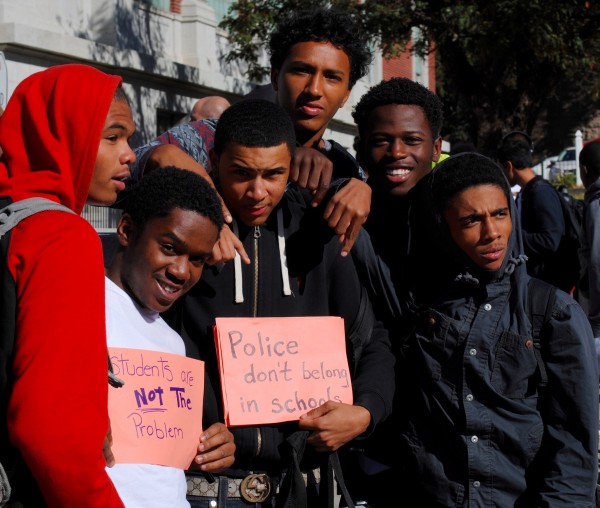 The public interest in both the incident and subsequent investigation is clear, the groups stated, pointing to the extensive media coverage of the incident, the subsequent student protests, and the important policy issues the incident raised. In requesting the release of the documents, the groups noted that in August the State Police voluntarily released a detailed report into the Cranston Police Department and its “Ticketgate” scandal.
The public interest in both the incident and subsequent investigation is clear, the groups stated, pointing to the extensive media coverage of the incident, the subsequent student protests, and the important policy issues the incident raised. In requesting the release of the documents, the groups noted that in August the State Police voluntarily released a detailed report into the Cranston Police Department and its “Ticketgate” scandal.
“Like that report, release of this information would shed light on important government issues, and particularly the role, responsibilities and powers of school resource officers in the schools,” the groups stated. By releasing this information, the groups noted, the State Police would be acting in line with an October 20 memo released by Governor Gina Raimondo’s office that emphasized the importance of state agencies disclosing information under APRA whenever possible.
“In balancing the public’s right to know versus any general privacy interests, we clearly believe the public interest is paramount in this instance,” the groups stated. Recognizing the need to protect the privacy of some individuals whose statements contributed to the report, the groups reminded the State Police that APRA provides for the redaction of those names and other personally identifying information rather than withholding the records.
ACLU of RI executive director Steven Brown said: “Release of the State Police report and materials is critical to promoting transparency and the public’s right to know in understanding this controversial incident that brought to light the many serious concerns raised by the routine presence of police officers in schools”
Martha Yager, program coordinator for the AFSC – SENE, said today: “I find it disturbing that it is deemed acceptable for a police officer to slam a child to the floor in school and arrest him. When a young person is loud and angry, should not the response be to patiently defuse the situation? Are not schools among the places we should teach children how to deal with their anger and distress? Why are children arrested when no law is broken? We need these documents to get a better handle on how to change a system that criminalizes children at school.”
NAACP Providence Branch President Jim Vincent added: “Although the police officer in question was cleared, the NAACP Providence Branch finds the use of force on a 14-year-old child very disturbing and calls into question whether police officers should be in schools in the first place.”
After the October incident at Tolman High School, the ACLU called on all school districts that currently have school resource officers to re-evaluate their use in the schools and to revise the agreements they have with police departments that set out their job responsibilities.
A copy of the APRA letter is available here: http://riaclu.org/images/uploads/Tolman_High_School_State_Police_APRA.pdf
From an ACLU press release
More reading:
How nonviolence street workers kept the peace in Pawtucket
Tolman students report disturbing police behavior
Violence, protest at Tolman leads to dialogue, opportunity for students
After the violence at Tolman: ‘What Now?’
ACLU calls on schools to revise policies on SROs
]]>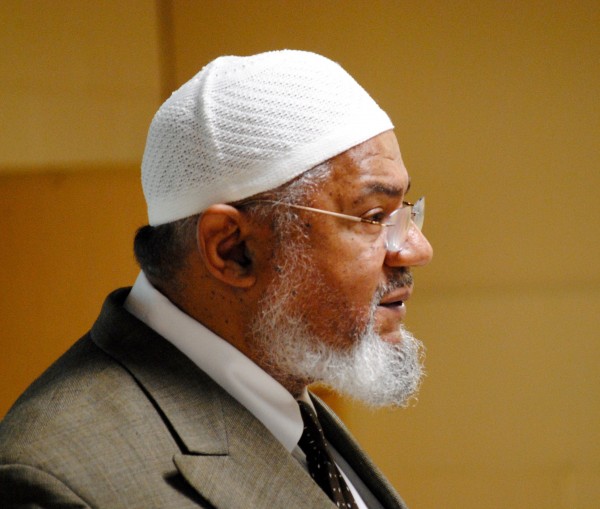
“I wish to welcome you and also seek your assistance in trying to join together and be able to dispel a lot of these unfortunate characterizations of the Muslim community,” said Imam Farid Ansari, to the crowd gathered inside the Islamic Center of Rhode Island in Providence. Ansair was speaking for the Rhode Island Council for Muslim Advancement, (RICMA).
The rise of Islamophobia and anti-Muslim violence across the country in response to recent terror attacks and political demagoguery has lead Muslim leaders in our state to make strong statements unequivocally condemning the terror attacks in Paris and the recent mass shooting in San Bernardino. Ansari said, “these acts are not representative of the Islamic faith…
“The backlash of these atrocious attacks have been felt deeply in the Muslim community nationwide. Inflammatory rhetoric as demonstrated by some politicians to isolate and marginalize American Muslims is reckless and undermines the safety and security of our great nation,” Ansari continued.
On a positive note, he said, “the American Muslim community in Rhode Island has unprecedented support from public officials, law enforcement, faith community and fellow citizens and we deeply appreciate this support.”
To counter this wave of mistrust, hatred and violence and because “we strongly believe that hate can only be countered by love and peace,” Ansari announced that, “we will be expanding our engagement with the Rhode Island community, to launch several social and educational programs across the state.”
These programs include an open house this Saturday from 1-3 at the Islamic Center, and continuing open houses at mosques throughout the state.
Other speakers took to the podium to denounce Islamophobia and to stand in solidarity with the Muslim community. Lutheran Bishop James Hazelwood lamented the way politicians have used the tragic recent events as an opportunity to divide rather to unite.
Jim Vincent of the NAACP says that his organization is “totally against the xenophobia that is happening in our country today.” Blaming all Muslims for the attacks in Paris or San Bernardino makes as much sense as blaming all Christians for the actions of the KKK, just because they use the cross as their symbol.
Episcopal Bishop Nicholas Knisely, said, “It’s important for us… to reject the voices calling for us to treat the people of one faith differently than all others.”
“Words have power,” said Rabbi Sarah Mack of the Greater Providence Board of Rabbis, “Our language can create good will and harmony in the community, or as we have sadly seen in recent weeks, our words can build mistrust, hatred and xenophobia.”
Dr. Wendy Ibraham of the Sisters Wing of RICMA, said that speaking for women Muslims is difficult, because they are such a diverse group. “Eighteen years ago, I decided to adopt a faith that believed in love and freedom and mercy and justice and kindness for all people, regardless of faith or ethnicity or color or creed… It’s important right now for Muslims to come forward and tell you what our religion is about.”
Toby Ayers, on behalf of the Rhode Island for Community and Justice and runs a youth program called Project Respect. In this program, “Young people become leaders in service to the mission of fighting bias, bigotry, and racism by promoting understanding between all races, religions and cultures through advocacy, conflict resolution and education.
Reverend Thomas Wiles, of the American Baptists channeled Roger Williams, the founder of Rhode Island, who championed religious liberty and freedom of conscience.
“We continue to proclaim,” says Wiles, “that for faith to be true it must be free.”
Evangelical Pastor Andrew Mook advocated for a radical Christianity that embraces love and peace, even at the cost of one’s own life.
Last up was Reverend Donald Anderson, who decided to name the “elephant in the room,” Donald Trump. (That the elephant is the symbol of the Republican Party might be a subtle joke on Anderson’s part.)
“We are called, as faith leaders, to speak truth to power. So let’s do that. Mr Trump, we will not stand for your demagoguery that leads to discrimination. For those people who would follow him and his foolishness, those who would value temperament more than truth, audacity more than accuracy, let us say that love will win.”
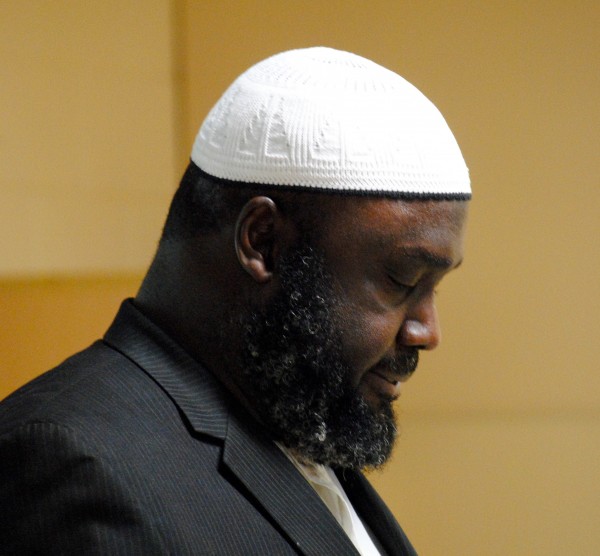
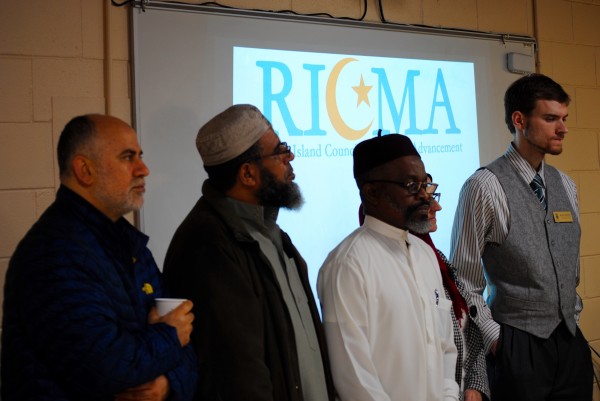
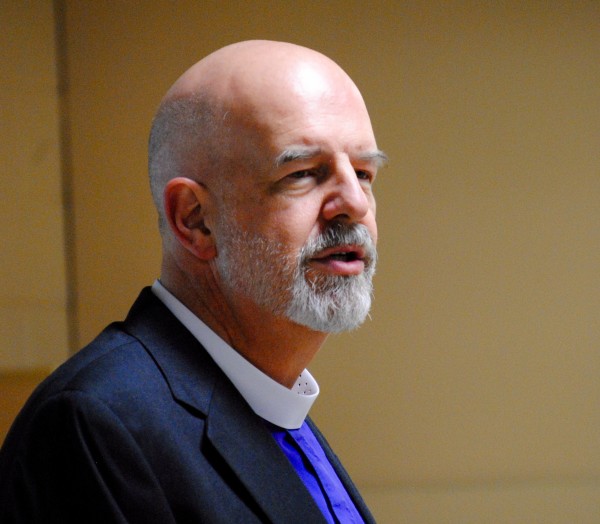
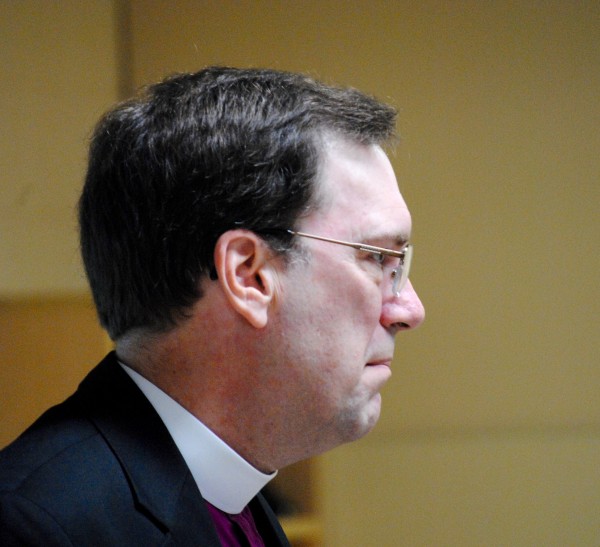
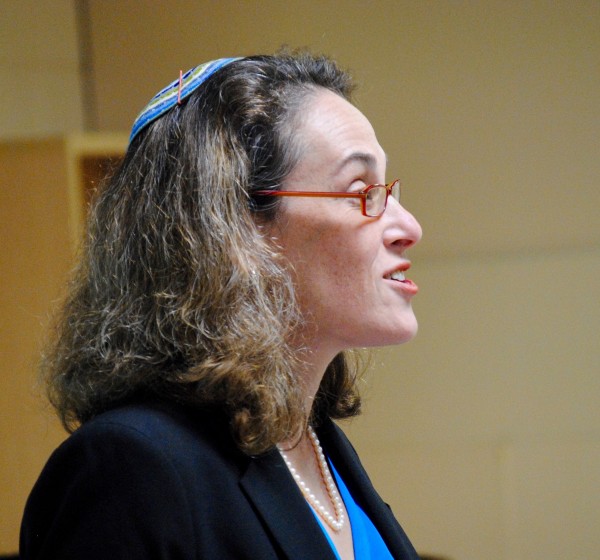
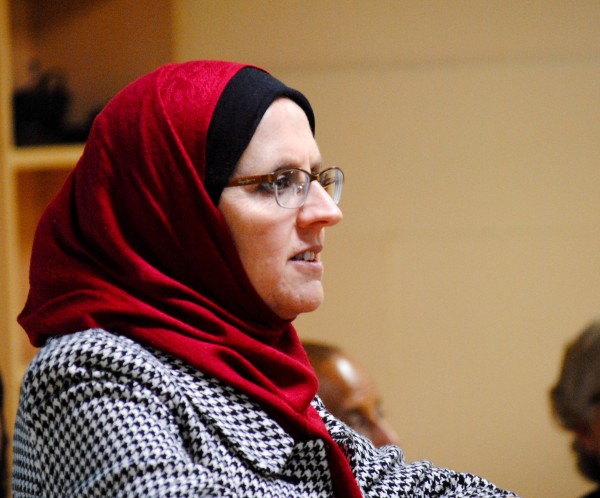
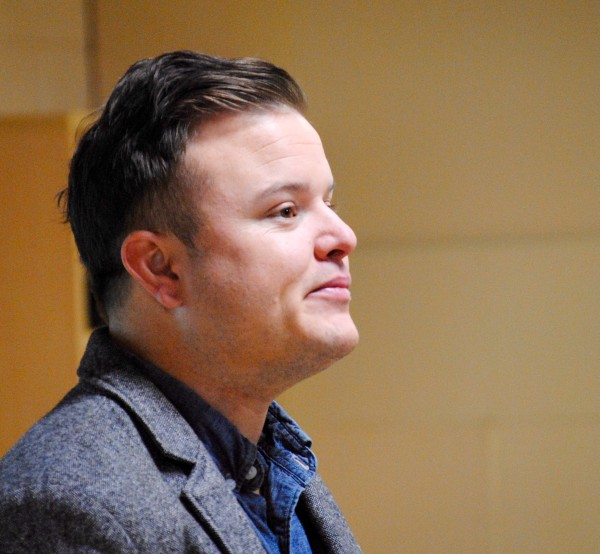
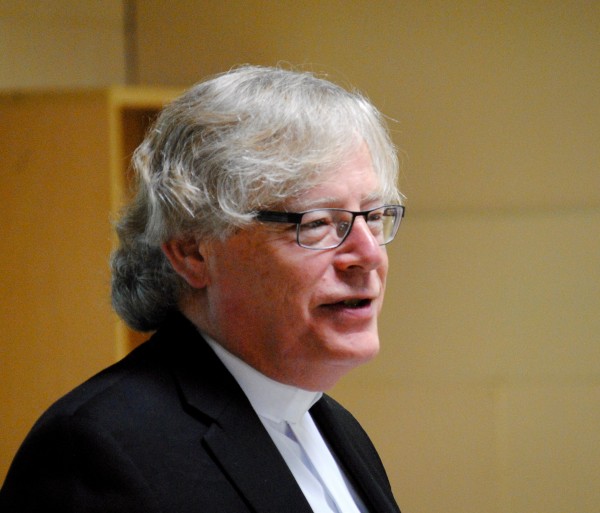
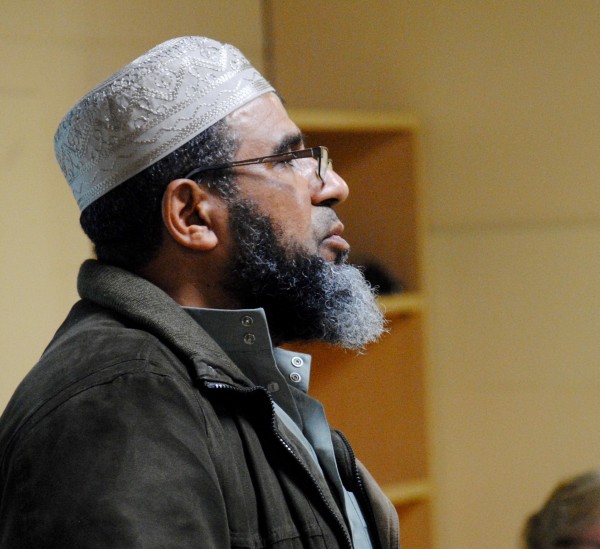
 Race and racism is the topic of discussion in the press. Yet it remains to be seen if this discussion will include the use of the dreaded c-word (class) or dare use the g-verb of what harms people of color daily (gentrification). Here at RIFuture, we want to spice it up a little and talk about those issues as part of a guide to activists in #BlackLivesMatter and other movements.
Race and racism is the topic of discussion in the press. Yet it remains to be seen if this discussion will include the use of the dreaded c-word (class) or dare use the g-verb of what harms people of color daily (gentrification). Here at RIFuture, we want to spice it up a little and talk about those issues as part of a guide to activists in #BlackLivesMatter and other movements.
We are approaching winter. I hope to suggest some books that activists can study amongst themselves so to better grasp how to radicalize their movements. Included on the list are suggestions by Antoinette Gomes of the Rhode Island College Unity Center, Ray Rickman of Rhode Island Black Heritage and Stages of Freedom, Jim Vincent of the NAACP, and Imam Farid Ansari of the Muslim American Dawah Center of Rhode Island, who has a background as a member of the Nation of Islam. Although these individuals have contributed to this list, the politics of volumes I suggest should not be construed as their own nor should my comments connected to my suggestions be conflated with their views. I would also be remiss if I did not add that, even though I consider myself a white ally, the reality is that any person of color has a better understanding of these issues in their little finger than I might in all my years of research. This is not intended as anything other than polite suggestion.
- Lies My Teacher Told Me: Everything Your American History Textbook Got Wrong by James W. Loewen (Suggested by Antoinette Gomes)
- Citizen: An American Lyric by Claudia Rankine (Suggested by Antoinette Gomes)
- In the Matter of Color: Race and the American Legal Process: The Colonial Period (Race and the American Legal Process, Volume I)/Shades of Freedom: Racial Politics and Presumptions of the American Legal Process (Race and the American Legal Process, Volume II) by A. Leon Higginbotham (Suggested by Farid Ansari)
- The New Jim Crow by Michelle Alexander (Suggested by Jim Vincent)
- Between the World and Me by Ta-Nehisi Coate (Suggested by Ray Rickman)- A meditation on race in America.
- March: Book One by John Lewis (Suggested by Ray Rickman)- Congressman Lewis writes about his childhood and the beginning of his work in the Civil Rights Movement.
- The Autobiography of Malcolm X As Told to Alex Haley– This book remains a vital manual for understanding the inherent value of any member of a minority group. Despite the problems in the text caused by Haley’s intentional distortion of Malcolm X’s politics, it is a critical volume.
- A Lie of Reinvention: Correcting Manning Marable’s Malcolm X edited by Jared Ball and Todd Steven Burroughs- When Marable’s biography of the slain leader was published posthumously, the Left in America was stunned by its lunacy. Obsessed with tabloid sexuality issues and trying to say that Malcolm X prefigured the neoliberal Obama administration, it was roundly condemned by everyone who knew the truth. Several rebuttal volumes were published but I would argue this is perhaps the finest. There is a corresponding collection of media files featuring discussions with various Left African American scholars at Prof. Ball’s website.
- The Wretched of the Earth by Frantz Fanon– Fanon was lying on his deathbed and dictated the material to his wife as it was written. The book analyzes the decolonization and how oppressed peoples can reorganize their societies. The first chapter, titled On Violence, was a stunning riposte to pacifists.
- Black Skin White Masks by Frantz Fanon– Here the author writes a classic psycho-analytic dissection of racism and how it affects the victims.
- The Souls of Black Folk by W.E.B. Du Bois– The book that argued ‘the problem of the Twentieth Century is the problem of the color line’, something all the more relevant today. Du Bois spared no punches when he fired across the bow of Booker T. Washington and dared people of color to dream of something greater than the lives of vocational workers dictated by the Tuskegee Institute.
- John Brown by W.E.B. Du Bois– John Brown, the abolitionist martyr, was not the first to say Black Lives Matter, but when ‘he captured Harper’s Ferry, with his nineteen men so few/And frightened Old Virginnia till she trembled thru and thru’, the entirety of the United States was rocked so hard it caused a Civil War. I have previously written CounterPunch where I argue this is an essential volume for all white activists to read.
- Race and Racism: An Introduction by Carolyn Fluehr-Lobban- A fantastic volume that explains the intricacies and contradictions of race written by a longtime member of the Rhode Island Black Heritage Society who taught classes on this topic at Rhode Island College.
- Orientalism by Edward Said– A classic dissection of the notion of ‘The Orient’ as an imperialist construct.
- The America in the King Years Trilogy by Taylor Branch- Branch’s epic biography of Martin Luther King, Jr. has some flaws, especially considering his too-close-for-comfort relationship to President Bill Clinton, yet this is essential reading, especially the first volume, Parting the Waters.
- Hopeless: Barack Obama and the Politics of Illusion edited by Jeffrey St. Clair and Joshua Frank- This volume is a Left-progressive response to the Obama administration. It includes essays from radical African writers to poor white southerners who have been equally marginalized by the neoliberal policies of this president.
- Pedagogy of the Oppressed by Paolo Freire– This volume that argues for a re-definition of how teachers teach and students learn. Our charter school champions in the state and city governments could learn a thing or two from Freire.
- What Gandhi Says: About Nonviolence, Resistance and Courage by Norman Finkelstein- Finkelstein is originally a Marxist and advocate for the Palestinians. Yet he turned to Gandhi to develop a manual for the people he loves so dearly and ended up giving us all a gift, dedicating the book to members of Occupy Wall Street. He has no delusions about the Mahatma and is very open about this but also has some stunning insights to share.
- Communists in Harlem During the Depression by Mark Naison- A fantastic case study of liberation politics and a cautionary tale. The Communist Party had some truly brilliant moments, such as their campaign for the Scottsboro Boys, and some truly problematic ones.
- A Brief History of Neoliberalism by David Harvey– When you go to another country, you find political parties that have wildly different economic programs. Yet both the American Democratic and Republican Parties rely on identity and social issue politics to win votes. Why? The reason is that both parties subscribe to a brand of economics called neoliberalism, which dictates mass-privatization of public utilities, eradication of the social safety net, and austerity policies. Harvey presents a very readable and vital history of how America got to where we are today economically.
- Here I Stand by Paul Robeson- One-half memoir, one-half manifesto, this testament of the unabashed champion of his people, who faced censure from the McCarthyist mob in the 1950s, is a brilliant short collection of writings.
- Anarchism: From Theory to Practice by Daniel Guérin– A classic pamphlet that explains the basics of libertarian socialism and the history of a communist movement that values liberty in a fashion far more honest than the old Leninist tradition did.
- On Liberty by John Stuart Mill– Whenever one talks about rights and liberty, they consciously or unconsciously are invoking the ideas laid out by Mill.
- A People’s History of the United States by Howard Zinn– The author was open in his later years he made some mistakes and tried to impose a doctrinaire vision of class on the history of America that had some blind spots, including a gap regarding LGBTQQI people. Yet the book is so beautiful in some parts I still find myself misting up, especially when I read this passage:
There is no way of measuring the effect of that southern movement on the sensibilities of a whole generation of young black people, or of tracing the process by which some of them became activists and leaders. In Lee County, Georgia, after the events of 1961-1962, a black teenager named James Crawford joined SNCC and began taking black people to the county courthouse to vote. One day, bringing a woman there, he was approached by the deputy registrar. Another SNCC worker took notes on the conversation:
REGISTRAR: What do you want?
CRAWFORD: I brought this lady down to register.
REGISTRAR: (after giving the woman a card to fill out and sending her outside in the hall) Why did you bring this lady down here?
CRAWFORD: Because she wants to be a first class citizen like y’all.
REGISTRAR: Who are you to bring people down to register?
CRAWFORD: It’s my job.
REGISTRAR: Suppose you get two bullets in your head right now?
CRAWFORD: I got to die anyhow.
REGISTRAR: If I don’t do it, I can get somebody else to do it. (No reply)
REGISTRAR: Are you scared?
CRAWFORD: No.
REGISTRAR: Suppose somebody came in that door and shoot you in the back of the head right now. What would you do?
CRAWFORD: I couldn’t do nothing. If they shoot me in the back of the head there are people coming from all over the world.
REGISTRAR: What people?
CRAWFORD: The people I work for.
This list of books is not perfect and I do not pretend to that. I would be a fool not to note that there are almost no titles that deal with feminist issues and almost no women authors. I would in fact love to see Elisha Aldrich or another woman put together that list. But I hope that, armed with a curriculum that will keep these young people busy until spring, the winter will not kill the activist spirit as it did in the case of Occupy Providence. In the era of the charter school and cops who body-slam young women to the schoolhouse floor as if it were wrestle-mania, critical thinking in minority youths is a public enemy and democracy is the real terrorist threat. My hope and the hope of many is they will embrace their potential and create a big-tent movement that embraces labor unions, progressive religious bodies, women’s groups, LGBTQQI liberators, and a radical press to start a peaceful rebellion and win a bloodless class war.
]]> Taft Mazotti, president of the Providence police union, and Jim Vincent, executive director of the Providence chapter of the NAACP, have very different opinions on the actions of a 17-year-old black employee of an Atwells Avenue Dunkin Donuts who wrote “#Blacklivesmatter” on a cop’s coffee cup.
Taft Mazotti, president of the Providence police union, and Jim Vincent, executive director of the Providence chapter of the NAACP, have very different opinions on the actions of a 17-year-old black employee of an Atwells Avenue Dunkin Donuts who wrote “#Blacklivesmatter” on a cop’s coffee cup.
The police union issued a press release chiding the teenage girl and the Black Lives Matter movement, while Vincent defended the young woman and the catch phrase that has unified people who feel that black people continue to be marginalized in America.
“The negativity by the #Blacklivesmatter organization towards Police across this nation is creating a hostile environment that is not resolving any problems or issues, but making it worse for our communities,” according to the press release. “They are doing this by increasing tensions amongst police and the people they serve.”
But Vincent thought it was the police who are increasing community tensions with its handling of the incident.
“I just think it makes the union look bad,” he told RI Future. “It gives people the impression that black lives don’t matter to them.”
Manzotti told RI Future this morning that the issue raised concern for the union because they believe that someone who would write black lives matter on a coffee cup may also try to poison a police officers’ coffee. “There’s been a concern that police officers have to be weary about where we can get something to eat or drink,” Manzotti said.
Vincent scoffed at the assumption that asserting that black lives matter indicates a direct threat to a police officer, noting that the movement is not even against police officers. “You cannot imply that because someone says black lives matter that they are against the police,” he said. “I think she probably just wanted to communicate that black lives matter and the officer took it the wrong way.”
I asked both Manzotti and Vincent if the officer missed an opportunity to dialogue with the woman about what the Black Lives Matter movement means to her.
“I think they missed an awesome opportunity to do some real community policing,” Vincent said. “Instead of bringing the community together they further fractured it. They may not have meant to do this but that’s what happened.”
Manzotti said the officer did not notice the message on his coffee cup until he arrived at work. “We’re a very busy department,” he said. “For an officer to take time to sit down with someone…”
Manzotti stopped mid sentence to tack away from officer time management to put the onus on the employee. “Let’s turn this around,” he said. “Could the employee have reached out and started a conversation?” When reminded he was tasking an urban teenager of color, rather than a law enforcement officer, with taking the lead in starting this conversation, he said, “Every single person knows right from wrong.”
Manzotti said he thought the young woman should be fired, but was careful to explain that the union did not ask the owner to fire her when they spoke earlier this week.
“We asked that he do whatever he feels is necessary to rectify the situation,” Manzotti told RI Future. “I can’t tell him what to do but I know if I had an employee working at my small business who did that, that person would not be working for me.”
Vincent acknowledged the teenager “maybe used poor judgment” but agreed with a reporter who said the employer would likely lose a wrongful termination lawsuit, as well as risk national backlash. “If there was no clear policy in place,” Vincent said, “…it’s hard to fire someone for something like this.”
Perhaps their biggest difference concerned the phrase black lives matter.
“I’d like to hear the union say black lives matter,” Vincent said. “Why can’t they say that? What is it that’s so difficult for them about acknowledging that black lives matter? It suggests to the community that black lives don’t matter to them.”
Manzotti was careful to avoid acknowledging that black lives matter and, like in the initial press release that kicked off this tempest in a teapot, explained, “because, to us, all lives matter.” He said he has not seen evidence in his life or career that black lives matter less than white lives.
Vincent said supplanting ‘all lives matter’ for ‘black lives matter’ is “almost like a code word for saying you don’t believe black lives matter.” He added, “Either intentionally or unintentionally, it marginalizes and minimizes the value of black lives.”
]]> “Before the Voting Rights Act of 1965,” said Jim Vincent, president of the NAACP Providence, “the majority of Black Americans were unable to vote. That’s what was happening in the Jim Crow south… Civil Rights activists fought, bled and died for these rights, and they are being rolled back every day.”
“Before the Voting Rights Act of 1965,” said Jim Vincent, president of the NAACP Providence, “the majority of Black Americans were unable to vote. That’s what was happening in the Jim Crow south… Civil Rights activists fought, bled and died for these rights, and they are being rolled back every day.”
Vincent was speaking at an ACLU panel discussion held at the Providence Public Library in August entitled, “The Voting Rights Act at 50: The Promise and The Struggle.” Hilary Davis of the ACLU directed the event, and in addition to Vincent, Kate Bowden of the RI Disability Law Center and Lee Ann Byrne of the RI Coalition for the Homeless attended.
The history of voter disenfranchisement was briefly discussed, as was the Voter ID laws that the RI General Assembly passed a few years ago. Many politicians feel that having to show a picture ID at the polls is not an undue burden, but Hilary Davis pointed out that years ago, many thought poll taxes, now seen as exclusionary, were not a big deal. Poll taxes, Jim Vincent added, “were designed to disenfranchise a whole group of people so that they couldn’t participate in our democracy.”
After the Voting Rights Act was passed 50 years ago, the percentage of registered black voters rose from 25 to 62 percent. More than that, the Voting Rights Act “provided the right to assistance in the voting booth. This allowed the illiterate, or the disabled, to vote,” said Kate Bowden.
For 47 years or so the Voting Rights Act was doing great. “Then states began to role back voting rights,” said Davis, adding that the Supreme Court virtually eliminated the VR Act when they struck down key provisions. “Over night… states started to enact laws to limit access… It was within a number of hours of Supreme Court decision that laws were introduced to limit voting rights.
And these laws are racially biased. Before Obama was elected President, seven states had laws restricting voter rights,” said Vincent. The number is around 25 now, and Rhode Island is not exempt.
“Rhode Island rushed to pass a [Voter ID] law,” said Davis, “Unlike most laws this is based on a couple of anecdotal incidents… Stats show their is virtually no evidence of voter fraud. Mail ballots became easier to obtain, the only place where fraud was found…No one thought that a Democratic [Party majority] state would manage to do that.”
Lee Ann Byrne said that for the homeless population though, “obtaining an ID is important to access many services… it comes at a major expense” and “despite the availability of the free IDs, it doesn’t make sense to get one that is good only for voting.”
Furthermore, said Byrne, “Poll worker training is a bit spotty” on the issue of voting without a permanent address. “We have a highly mobile population, our constituents almost never have an ID that matches their address.” And denying someone the right to vote or forcing them to cast a provisional ballot under these conditions, is not the law.
People can become embarrassed or caused distress at the polls if they can’t be certain about their right to vote. “There is a concern about being challenged or turned down when they make the effort,” said Byrne. To date only about 900 voter IDs have been issued by the Secretary of State’s office. Before the introduction of voter ID in Rhode Island, there were “zero prosecutions for in person voter impersonation’” but since the passage of the law, said Davis, otherwise qualified voters have been turned away.
Being forced to get a photo ID in order to vote, said Vincent, “is a form of poll tax.”
Another issue of voting concern to the ACLU is “prison based gerrymandering.” Right now the 4000 inmates at the ACI are counted as living in Cranston, on Howard Ave. These people are unable to vote, meaning that the citizens in this district have more voting power than people in the rest of the state. Their vote counts as more because there are less people voting in their district.
The state Senate passed legislation to correct this problem, which would count those people at the ACI as living at their home address, but it has not moved in the House.
The panel discussed other issues, such as long lines and long waits at the polls in some districts, which may cause people to lose out on their chance to vote if time is scarce, broken voting machines, lack of childcare at polls, mail ballot fraud, the need for early voting and issues regarding the Board of Elections.
The ACLU recommends two things needed immediately for the needed reform of our elections. First, the ACLU needs people to volunteer as poll monitors. Poll monitors would note when voters are turned away, when equipment malfunctions or when other irregularities occur. Secondly, the ACLU would like to see the voter ID law repealed.
To accomplish the second goal the public needs to talk to our legislators. Too many people think showing an ID at the poll is no big deal, but for the homeless, the disabled or the poor, securing an ID can be a terrific burden. Thoroughly discouraged, eligible voters may decide to skip voting all together, and this can’t be good for our putative democracy.
]]>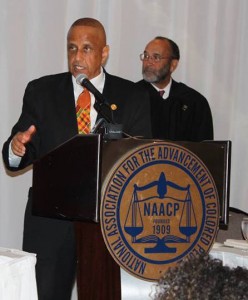 On July 21 I had the opportunity to sit down with Jim Vincent of the Providence NAACP and discussed a variety of topics. Mr. Vincent is a graduate of the 1973 Dartmouth College Urban Studies and Government program and hold an McP in City Planning from the University of Pennsylvania. Our conversation covered a variety of topics, including the prison and judicial reform Gov. Raimondo recently enacted, police recruitment policies, and the national election.
On July 21 I had the opportunity to sit down with Jim Vincent of the Providence NAACP and discussed a variety of topics. Mr. Vincent is a graduate of the 1973 Dartmouth College Urban Studies and Government program and hold an McP in City Planning from the University of Pennsylvania. Our conversation covered a variety of topics, including the prison and judicial reform Gov. Raimondo recently enacted, police recruitment policies, and the national election.
The NAACP is one of the oldest still-extant civil rights groups in America. Founded on February 12, 1909, it has been a major advocate for the rights of black and brown people since its inception, working to abolish Jim Crow and promote desegregation. It has been especially active in support for LGBTQQI rights and AIDS activism. This was especially prominent when Julian Bond, former Chairman, boycotted the 2006 funeral of Coretta Scott King, wife of Dr. Martin Luther King, Jr. because the family had chosen a church that opposed gay rights.
]]>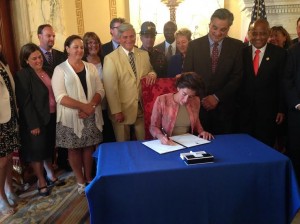
Governor Gina Raimondo launched an initiative to reinvent Rhode Island’s criminal justice system, with hopes of reducing recidivism rates, analyzing racial disparities within prisons, and properly treating addiction and mental illness. The initiative, known as the Justice Reinvestment Working Group, will work closely with The Pew Charitable Trusts, the U.S. Department of Justice’s Bureau of Justice Assistance, and the Council of State Governments to make the state’s criminal justice system more effective at a smaller cost.
Governor Raimondo compared the group’s creation to her Reinventing Medicaid task force that was brought together last year. Just as Rhode Island has the second highest enrollee cost for Medicaid in the country, Rhode Island also has the third highest probation rate in the nation, with 2,737 people on probation per 100,000 residents. One in 44 Rhode Islanders are on probation, and one in 21 Providence residents are on probation.
“Similar to Medicaid, we’re spending too much money, and not getting the outcomes that people deserve,” she said.
Half of state costs related to public safety are spent on the Department of Corrections, totaling in at around $408.5 million. Only 8 percent, or $15 million, of that budget goes to probation and parole services.
“Here’s the reality,” Raimondo said. “We have to direct our resources more effectively in the probation and parole system as well. If you’re trying to supervise everybody, you’re not really supervising anybody.”
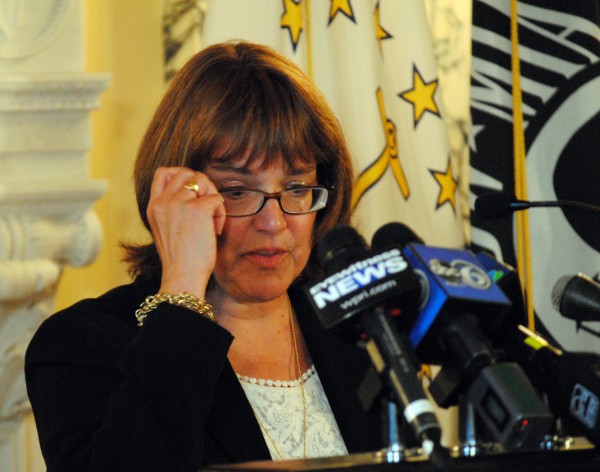
The working group, which will be co-chaired by Rhode Island Supreme Court Chief Justice Paul Suttell, and retired Superior Court Associate Justice Judith Savage, puts together stakeholders in the system to study these issues, and create a set of recommendations to give to the state in several months time. They will look at what other states have done to improve their own systems, and use a data driven approach to create new standards for Rhode Island.
Although reducing costs is a large part of what the group hopes to accomplish, Governor Raimondo’s main focus for them is to create a more fair justice system. The working group will find ways to improve treatment for those who suffer from addiction and mental illness, rather than continually incarcerating them. They will also evaluate how to reduce the recidivism rate, which was 48 percent in 2009, as well as analyze racial disparities to figure out exactly who is being arrested and on what charges. According to Raimondo, without taking a serious look at these issues, the justice system becomes a revolving door, with prisoners returning over and over again.
“At the end of every statistic is a human being who deserves a fair shake, who deserves an efficient, effective, and honest criminal justice system, and who deserves another chance,” she said.
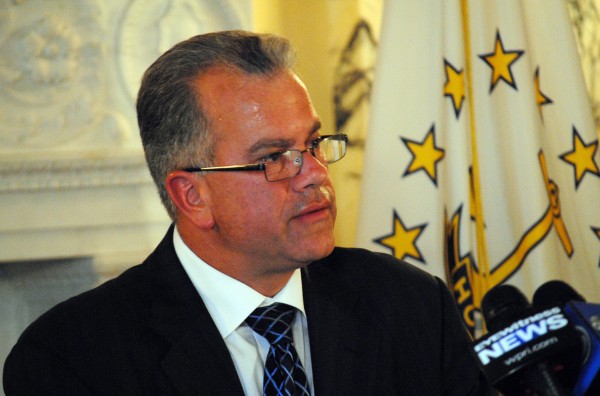
Speaker of the House Nicholas Mattiello also commented on the state’s probation and parole rate, saying that the sentences are too long, making Rhode Island an outlier among other states. Putting someone on probation or parole for too long, Mattiello said, will “take the wind out of their sails, and you take away their hope of becoming productive members of the community in the future.”
As a lawyer, Mattiello has seen sentences that have gone upwards of 20 or 30 years. These sentences create an unbalanced system that can affect someone for the rest of their lives.
“If you’re on probation for 30 years, sometimes that can put you into your 80’s,” he said, also adding that sometimes thoughtful, alternative sentencing options can be better than harsh ones.
“Those that are not the most dangerous and violent, may be better served with less severe and restricting sentencing options,” he said.
Savage, who served on the Superior Court for more than two decades, believes that her place on the working group is a way for her to give back to the state. She told the story of a man she called Michael that had been arrested for breaking and entering into a home while drunk, looking for a place to sleep.
“It would have been easy to send Michael to prison for breaking and entering, and be done with it,” she said. But, she made another choice to have him sent to treatment instead.
“We exchanged loads of prison dollars for treatment dollars, but more importantly, we helped Michael,” she said. “That’s what motivates me. I want to make this system work better for all of us.”
Savage spent last year teaching a symposium on mass incarceration at Roger Williams University Law School, where she was able to lead the discussion on how to solve issues that the working group plans to tackle.
“Together, I firmly believe that we can achieve greater justice,” she said.
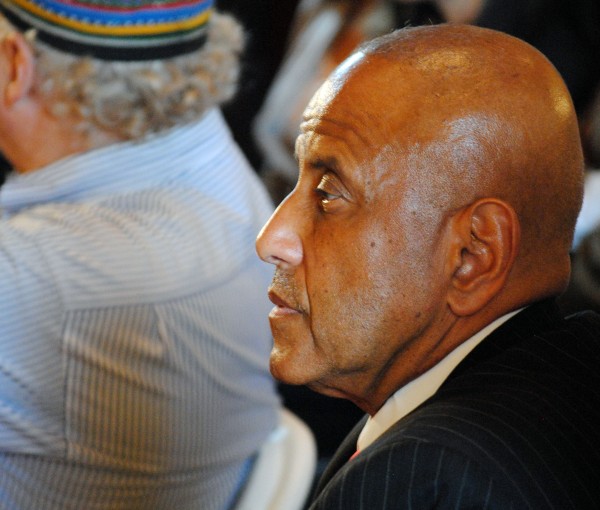
While some of the speakers did not quite touch upon the question of racial disparity in the criminal justice system, James Vincent, the President of the Rhode Island NAACP, said that he believes the initiative will help the issue.
“I think this is something that is very needed in this state,” he said. “I’m particularly interested in the racial disparity aspect of the work we’re going to be doing, and hopefully we’ll end up in a much better state because of this effort.”
Vincent will be serving in the work group, along with other members of the legislative, judicial, and executive branches, as well as members of other groups throughout the state.
Governor Raimondo’s executive order is not the first action that the state has taken to reinvest in the justice system. In 2008, House Bill 7204 enhanced parole discretion and standardized credits for the first time someone has served. Since the bill was adopted, the incarcerated population has dropped 19 percent, along with the recidivism rate.
]]>
